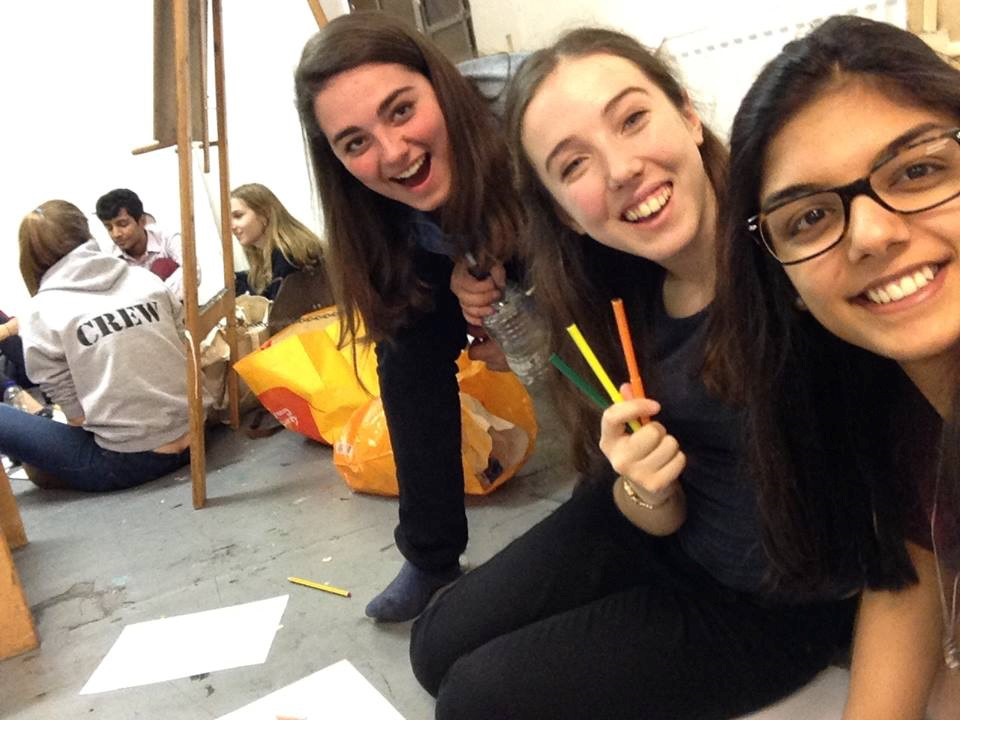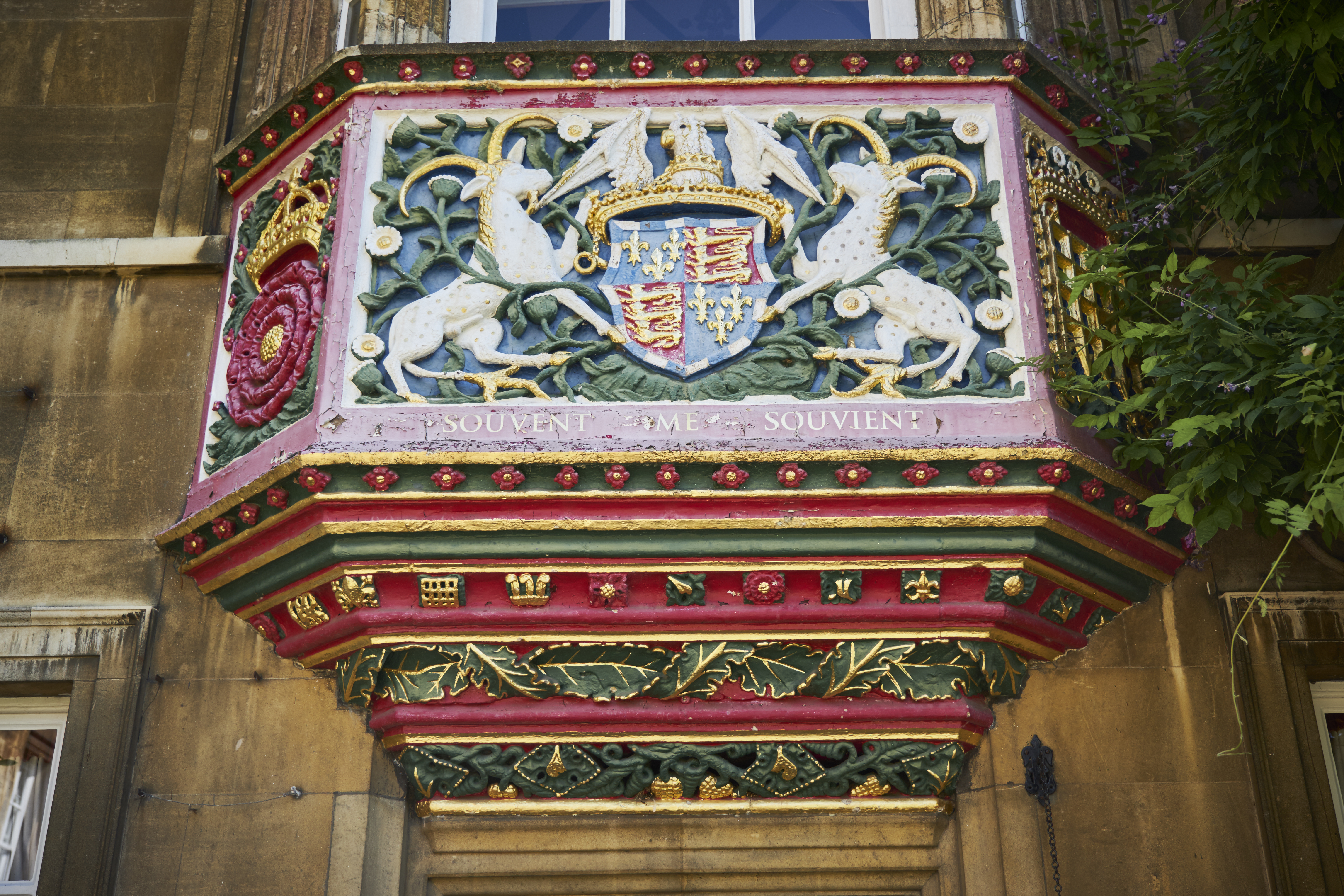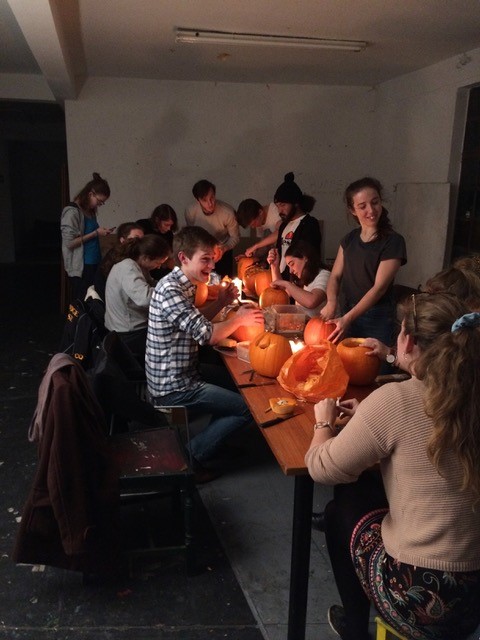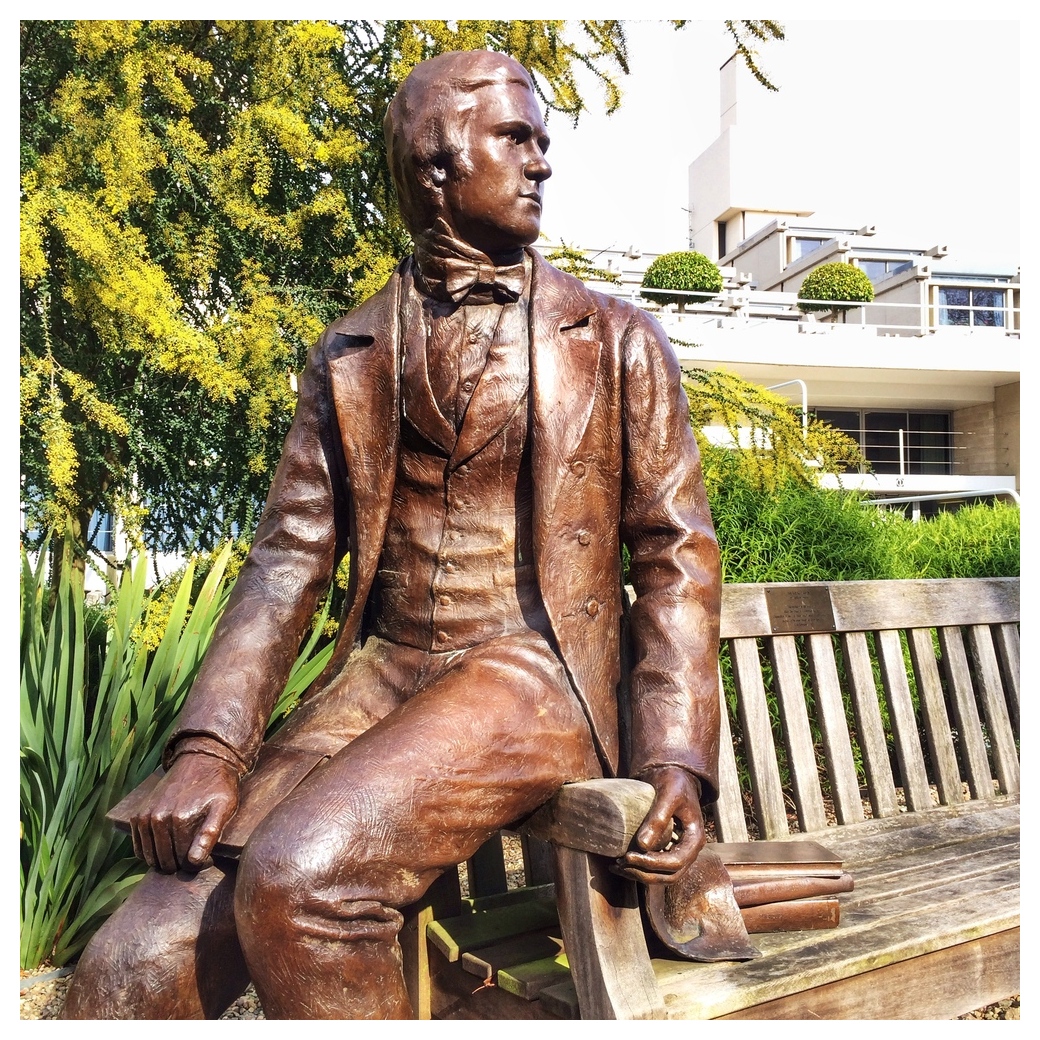"History of Art at Cambridge is great because you do study a lot of art first hand."

Arianna is from West London and wrote this at the end of her third year, having studied History of Art here at Christ's College, Cambridge.
How did you come to choose History of Art at Cambridge?
I didn’t choose Cambridge originally; I was going to do straight art, but discovered on an art foundation course that it was not for me. By that point I already had my A-level grades, which were good enough to apply to Cambridge with as a post-qualification applicant. A teacher at my school suggested it on the day I got my results. I was like, 'ooh I could do that' - and it turns out that I could!
Cambridge was at the top of the league tables for History of Art and that's a large part of why I picked it when I did. Also, for History of Art you want a place with galleries nearby, because it’s important to be able to look at art first hand. For me Cambridge was the right balance of city to art.
History of Art at Cambridge is great because you do study a lot of art first hand. You spend a lot of time in the Fitzwilliam Museum throughout the degree, and they have a whole course which is just walking around the different museums in Cambridge and the different Colleges, having a look at the architecture and the art that the College has, so you really get to know the art immediately around you.
Obviously it's true of every subject, but I also think that the supervision system is incomparable. The only other place where you would get that amount of contact time for History of Art is Oxford, and for me, the Cambridge course offered more options that I was interested in studying. I would definitely say that if you’re thinking of studying History of Art, go on the department website, and perhaps see the special subjects they have on offer at the moment – they do occasionally change depending on who the current teaching staff are, though that’s not too often. For example, there’s almost always a Renaissance Italian course, or the Russian course which I took and enjoyed.

How did you choose a College?
I knew I wanted a medium-sized College, one with a central location in Cambridge, and I often say I wanted one that was old and fairly wealthy – but when I think about it that definitely didn't apply to my second choice!
I think a big thing for me was that I looked at the website and it looked like it had a good atmosphere for art in general – like we have quite a few arty alumni like Nicholas Serota, Simon Schama, Anthony Caro etc., and that all looked pretty good to me on paper.
I’m really glad I ended up at Christ’s as it's far surpassed my expectations. I’m very sad to leave - it’s been amazing, it has a very stong community feel, I made really good friends early on, and just generally I've had a really great time.

How would you describe History of Art as a course?
I often describe History of Art to people who’ve never come across it before as actually bearing more similarities to studying English at school than History: we analyse art the way you might have been taught to analyse poetry, plays and novels. We write essays on the decisions behind an artwork, what the artist intended its effect to be, how it succeeds or fails in that – sometimes whether that’s important. For example, I wrote a short dissertation at the end of my first year on whether John Everett Millais’ ‘The Bridesmaid’ aimed to depict its subject in a sexualised and idealized manner, or sympathetically as a young woman first contemplating ideas of romance.
We also look at art’s historical impact, and of course vice versa, historical events’ impact on art. So while studying Imperial Russian art, we began with an essay on the impact of the Russian Academy of Art on painting in that period, which meant learning a fair amount about Peter the Great’s Westernisation of the country, and Catherine the Great’s interest in maintaining and furthering this new Western reputation through art. Or, while studying the English Renaissance, we discussed how increasing trade, new discoveries of the world, or, of course, the reformation, affected the types of artwork produced in Britain in the 16th century. That course was particularly good at allowing us to study all sorts of objects as art – jewellery, china, furniture, fashion, architecture, even tombstones, as well as painting and sculpture.
It’s worth remembering when considering this course that art can, of course, be very broadly defined: I found over my three years that I accidentally managed to study just as much architecture as art, despite thinking when I first started that I had absolutely no interest in analysing buildings – it seemed so boring compared to looking at the motives and skills behind paintings! But, to be honest, we broadly answer the same sorts of questions about architecture as art. ‘Why does this building look like this’?, ‘how does it sit in the context of its day?’, or sometimes things like what the recent technological advances that enabled new building techniques were. In the course I took on British architecture this year, we looked a fair bit at town planning, and how large areas of places like London, Bath, or Edinburgh are influenced by Roman architecture and city planning, while in the course I took on Gothic architecture in my second year, we spent some time learning about how to identify the period of a cathedral by the ‘tracery’ in its stained glass windows or its nave’s ‘elevations’ and column styles. We also looked a little at the amazing engineering feats these medieval stonemasons achieved, and I remember an essay I wrote on the political motives behind the design of the Sainte-Chapelle in Paris, which I was particularly proud of.
Honestly, History of Art is so much fun! One of my major gripes is its snobby or niche reputation! Studying art is just as fascinating as studying books, languages, history, AND you get to look and learn about movingly beautiful things every day. Oh, and also we still get to do ‘school trips’ to galleries/museums/stately homes! Lots of fun to get back to College of an evening and tell your friends how you escaped Cambridge for the day to ask the Duke of Buccleugh about his collection over lunch in his Northamtonshire manor (I’m totally helping the subject’s posh rep right now, aren’t I!).

What advice would you give sixth formers considering History of Art?
I'd say go to a lot of galleries: show an interest in the subject beyond what is written on paper. I think that, unfortunately, History of Art still has a reputation as a bit of an easy subject that you don’t have to work very hard for. That’s not true here! It’s as hard, in my opinion, as any other arts subject, and I don’t think it’s wise to apply for it because you think you might not have to work so hard to get in for it. So do go to lots of galleries if you can, and see what art there is available in your local area or nearest city - or if you’re going travelling, see what’s on in the area you’re visiting. Just pursue your interests, basically!
Obviously, also read a few books on the subject. The classic one to go to is Gombrich's 'Story of Art'; although, his book is supposed to be a giant survey of western art history and there are no women in it! So, he’s a good starting point, but I would say read about the kind of art you’re interested in: go out and find a book on it and they’ll be impressed that you did that. For example, when I was applying I knew I really liked Rembrandt, so I tried to read a bit more about the Dutch Golden Age, which I really didn’t know much about.
"I'd say go to a lot of galleries: show an interest in the subject beyond what is written on paper."
What was being in the final year of the course like?
It was difficult! I think the course gets harder the further into it you go, and by third year you have to balance three essays every two weeks alongside your dissertation (which is max 9000 words on any artwork you like). I found that quite hard to manage: I ended up doing most of my work for my dissertation in the vacations, although for many, that was good in some ways, like if you wanted to be able to go and research something specific that might not be available at Cambridge.
The dissertation gives you the chance to study something you’re specifically interested in yourself: you do a lot of work on it and really find out about it in a lot of depth. For me, my dissertation was the most interesting thing I worked on this year - I did it on 16th century English fashion, which was great. It was just really fun doing something that I chose myself and wanted to research in depth. Also, in both second and third year, you do special subjects which you pick yourself, which is good because it means that you’re not having to write essays on things you're not interested in for much of your degree.
What papers did you study this year?
I’ll say the papers I took in both second and third year, because other than adding the dissertation in third year, the course structure for History of Art stays pretty much the same those two years. We do a one-year part I and a two-year part II. In second year, I did 'French Gothic Architecture and English Renaissance', which covers both art and architecture. Then this year I did 'British Architecture', which I basically only took because I'd used up all the other options, but I actually really enjoyed it, and now have a lot to say about the buildings and cities around me. I also did the Russia course in my third year, which was on the website when I'd first applied and something I’d wanted to do from the start. I saved it until my final year and I’m very glad I did - it was really enjoyable. You can’t study Russian Art in quite a few other unis around the country, so I’m pretty pleased to have learnt about that particular part of art history.
In both years, you also have a course that you do alongside your special subjects throughout the whole year. So in second year you do 'Approaches', learning about different approaches to art history. And then in third year you do 'The Display of Art', which I preferred to 'Approaches' - you get to learn about the different roles art has played throughout history.
In History of Art, every year you do two terms of learning new material and one term which is revision, and writing your dissertation if you have one that year. I really disliked that about the course and would have preferred for it to be organised like some of the other arts courses, which do prelim exams in first year, so that they do three terms of learning new stuff essentially. Nevertheless, even with that structure you’re probably still packing in as much learning as anywhere else that offers the subject – in fact probably more.

Did you have a particular way of organising your work?
I didn’t but I should have! I only learnt in third year to timetable the hours of my day between reading, planning, and writing each essay, as well as any lectures, supervisions, or extracurriculars I had, which is stupid - you need to do so to make sure you get everything in on time. In first year, I used to carry around one notebook and put all my notes for every course in the same one. I look back on that and I’m like ‘why did I do that?!’ – it was such bad organization and it made revision so much harder! I'd also advise anyone taking History of Art (or any subject I guess) to start revision early; not necessarily starting the actual work early, but schedule your revision timetable well in advance, then you’ll have loads of leeway over exam term.
Did you manage to balance work and play?
It depends how you look at it! I’d say yes overall, because there were times where I prioritised work and there were times when I prioritised socialising.
I think that one thing I did well was that I didn’t stress too much about work in my first year, I just focused on enjoying my course and having a good time, making good friends and giving myself a solid foundation in Cambridge. I’m really pleased I did that because it set me up well for later on. I rowed for a lot of my time here, which was tricky to manage at times because rowing is very time-consuming, but I don’t think I would change that.
Even exam term went okay. I wasn’t one of those people who get crazy intense about work in exam term, which meant that in the end, I got a good grade, but it took some time for me to realise that it was a good grade and the fact that I didn’t go crazy over work was fine. I think that you can feel a pressure here to do too much. You do need days off!
The Cambridge workload looks pretty big from the outside, but there is flexibility. For History of Art at least, the supervisors were mostly really kind about late work or if you had a hard time that week and you needed to hand in an essay plan rather than the full essay. I would say that at the times where I've felt I was struggling with work, my tutor and my Director of Studies were supportive. It's worth mentioning this because a lot of people think that there's pressure at Cambridge that comes from above, but I've found that pressure was from my peers and myself, instead of my ‘teachers’ so to speak.

What have you enjoyed about your time at Christ’s?
The friends I've made. It's just wonderful having your best mate two minutes away, and it’s a really really good community atmosphere here in College. I liked being part of a microcommunity of the bigger community of the wider university; that’s a big bonus of the College system.
Then, it's pretty. My favourite spot in College is the Fellow’s Garden by the mulberry tree; it’s so peaceful there. I also loved my third year room. I lived in S6 which I think is the best room in College! It’s so lovely, you get a beautiful fireplace and a view onto two courts not just one. You get both a bedroom and a living room, and the living room was beautiful: I was in love with it!
Beyond the pastoral care I mentioned from my tutor and Director of Studies, Christ's has also helped me financially. They’ve given me like over £1000 in total to go travelling over various holidays. I got lots of travel grants since History of Art is eligible at Christ's for not just a travel grant in the summer but also one in the Easter holiday – sometimes you kind of have to go see art or architecture in person to understand it, and Christ’s gives you the money to do that, which is great.
"It's just wonderful having your best mate two minutes away, and it’s a really really good community atmosphere here in College."

Anthony Caro's scuplture of Darwin as a student.
Credit: Sir Cam
What did you do after the exams were over?
I was on the May Ball committee for Christ's both years that it was on while I was here. I was on the art and design subcommittee in my first year, and I was head of Art and Design this year which I love love loved. I really enjoyed being able to boss people around and having that much responsibility on me! It also means that I got free tickets to this ball and the next one. I'm not going to lie, it was a bit stressful this year and I didn’t really get to enjoy it to the full, so I’m looking forward to using those tickets next time. But for this year, we also did a committee ticket swap and went to Emmanuel June event for free, which was good. Yeah, May Balls are great fun, and being on the committee is also great, even though it’s a lot of work.
Looking back over your time at Cambridge, what do you feel like you have gained from being here?
So much! Really a lot. It's really changed me as a person, I wish I could go back and do it all over again. It's been hands down the best time of my life, and I don’t think I'm overstating it in saying that, because it's just been this short and intense period of lots and lots of happy memories, with loads of people I loved nearby. I’ve gained a huge amount in terms of growing up and meeting new people, aside from what I’ve gained academically. My best memories are probably of hanging out with my friends, May Week after exams when you have no essays to write, sitting in the park, swimming, going punting… bops (what cheezy discos get called here..)! Any negative memories of Cambridge are definitely far overshadowed by all of the positive ones.

Is there anything you would change about how you tackled life here?
I said already that I was pleased to have put work on hold to some extent until second and third year, but I think I would have turned down on the extra-curriculars at the start of second year and tried to focus on my work a bit because it was a step up and I wasn’t really ready for it. That being said, I imagine if I had done that I'd be sat here now being like ‘I wish I had done more extra curriculars’ - you can always find something to regret!
Do you have any plans for what you’ll do post-graduation?
Get a job! I think it's worth mentioning that people seem to think that History of Art is limiting, and it’s not! It's fine to go into anything you want from here. I’ve been to careers fairs where I’ve asked whether they'd still be interested in me with a degree in History of Art, and can confirm big companies say they like us as much as someone who's done History or English or whatever. So don’t stress about careers going into this subject. There's loads of support here as well; the Careers department is really really good, they give mock interviews, CV help, hold careers fairs, and send you plenty of emails with opportunities pretty much daily if you want them! Also, the fact that you have both a Director of Studies and a Tutor means that you have two people you can talk to about your personal feelings of where you’ll go, and so you get guidance in that aspect.
Other people from my course are planning on doing a masters here, or at the Courtauld in London, and are planning on working in the art world as curators or at the auction houses or in private galleries. A few are going into jobs like consultancy, I think one wants to be a teacher. The other girl in my year at Christ's is planning on doing a masters in Business in London. I came here not knowing what I wanted to do, and I’ve left not knowing what I want to do either, but that's okay! I wouldn’t want to change my experience here at all.
"Big companies say they like us as much as someone who's done History or English or whatever. So don’t stress about careers going into this subject."
September 2018
Please be aware if you're considering an application that our student writers describe their experiences. Although the majority of the information stays the same, some details may change from year to year. Do read the student profiles in combination with our undergraduate admissions pages for full information.
Back to Student profiles page / History of Art at Christ's / Next: Ruby's profile
